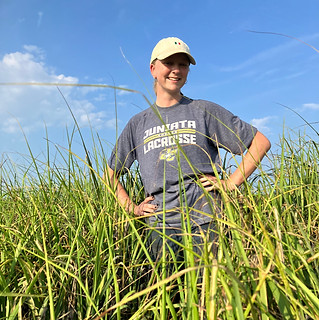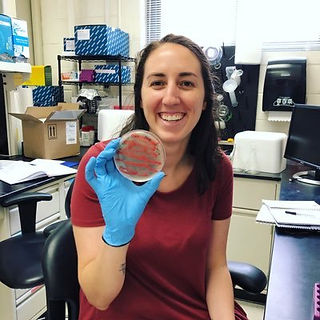Former mentees (students and technicians)



Will Ellis
Kate Moore
Grace Gibbs
Will graduated with a B.S. in Ecology from the University of Georgia in 2023. He assisted in field collections, processing, and molecular analysis of oyster samples over the summer of 2022. Will also conducted an independent study for his senior thesis examining the effects of boring sponge (Cliona spp.) infection in oysters on active predator choice of Atlantic oyster drills (Urosalpinx cinerea).
Kate graduated in spring 2023 with a B.S. in Ecology from the University of Georgia. She conducted an independent study examining the effects of body traits (size and condition) on filtration rates by Eastern oysters (Crassostrea virginica). For her senior thesis, Kate built off her independent study project to examine the effects of parasites specifically boring sponge (Cliona spp.) infection on oyster filtration rates.
Grace is an undergraduate student at Juniata College and conducted research with me in the summer of 2023 as a GCE LTER Intern co-mentored by Dr. Emlyn Resetarits. Grace examined the effects of salt marsh edge geomorphology on consumption of mud crabs. She also studied the influence of multiple parasites on consumption in coastal habitats including the invasive castrating barnacle Loxothylacus panopaei.


Blake Bayer
Blake is a second year in Ecology at the University of Georgia. Before undergrad, Blake worked in a horseshoe crab bleeding lab. Building from his previous work, he assisted with shucking oysters and conducting DNA extractions for qPCR analysis. Blake also helped out on a variety of projects in the lab including with animal care and husbandry, setting up predation experiments with oysters and Atlantic oyster drills, and conducting oyster filtration experiments.
Sarah Piña
Sarah is a third year in Ecology at the University of Georgia and a Peach State LSAMP scholar. She started working in the lab in the spring of 2022 assisting on multiple projects utilizing GIS analysis. Since then, Sarah has gotten her "feet wet" doing animal care and husbandry (feedings and tank water changes). Sarah also conducted filtration experiments to examine how filtration rates scale from individual oysters to entire oyster reefs.


Jasmin Johnson
Sofia Markiewicz
Jasmin was an NSF REU student working at Moss Landing Marine Labs and Cal State Monterey Bay in the summer of 2021. Her research focused on examining changes in fish diversity and commuity composition after the 2014-2015 marine heatwave (the blob). Jasmin used data collected by the CA Collaborative Fisheries Research Program between 2007 and 2020. She also assisted with the analysis of macroalgae from BRUVs in the surf zone along the California Coast.
Sofia was a senior honors thesis student at Scripps College (graduated Spring 2023) and was an NSF REU student through UGA's Odum School of Ecology in the summer of 2022. She spent the summer working on the Georgia coast conducting oyster reef sampling and examining the spatial drivers of macroparasite prevalence. Sofia's honors thesis focuses on the environmental drivers of mud blister worm prevalence and infection intensity in the Eastern oyster (Crassostrea virginica).



Lauren Clance
Lauren graduated from UNC Chapel Hill with a B.S. in Biology in 2017. As a research technician, Lauren assisted on a project researching the effects of marsh islands on fish and crustacean communities. She focused on how different size marshes influence juvenile fish condition and energy content. Lauren is now a Masters student at Dauphin Island Sea Lab. Lauren and I are still working on a meta-analysis on the effect of contaminants on predator-prey interaction in aquatic and marine ecosystems.
Lily Olmo
In the fall of 2017, Lily conducted an independent research project through the UNC Institute for the Environment. Lily created barricades along the marsh edge to determine the feasibility of blocking off access to the marsh surface for nekton. Lily tested the barricades functionality with predation assays along side of nets and traps. Lily returned in the summer of 2018 to investigate how predator-prey interactions vary across marsh islands of varying edge to area ratio. Lily was a 2018-2019 NOAA Hollings Scholar and graduated from UNC Chapel Hill in the Spring of 2020.
Marianna McMains (Miller)
Marianna initially came to work with me in the fall of 2016 while spending a semester at the coast through the UNC Institute for the Environment. For her independent research, Marianna manipulated marsh shoot density using wooden dowels as a Spartina alterniflora mimic to determine the importance of habitat complexity on predator-prey interactions in salt marshes. Marianna graduated from UNC Chapel Hill with a B.S. of Environmental Science in 2018 and came back to work as a research technician following graduation.

Lauren Clance


Andrew McMains
Andrew graduated in the Spring of 2017 from the University of Montana Western. Andrew worked as at research technician on a variety of marsh projects: night sampling, predator-prey tethering experiments and a residency study tagging juvenile fishes. He continues to collaborate on a project investigating trophic ecology of fishes across broad geographic regions. Andrew began pursuing a graduate degree in fisheries research with Dr. Jim Morely at ECU in 2020.
Claire Spear
Claire is graduate of the University of Tampa (2019) with degree in Environmental Sciences and Marine Science. Claire interned with me in the Summer of 2018. She assisted in marsh habitat sampling, fish collections, fish dissections for stable isotope analysis, and a variety of other projects with the UNC Coastal Fish Ecology Lab.
Paige Varner (Bippus)
Paige was an NSF REU student working at VIMS in the summer of 2014. Paige's research focused on assessing consumption rates with in tidal marshes along a salinity gradient in the Chesapeake Bay estuary from fully fresh (0 ppt) to fully marine (35 ppt). Paige assisted in the ground truthing of a standarized dried squid assay "Squipops" and was apart of a peer-reviewed publication from this work. Paige went on to pursue her PhD at Duke University in Environmental Engineering



Elianna Fox
Elianna is a 4th year pursuing at B.S. in Biology with an area emphasis in Marine Biology at UGA. For her senior thesis Elianna is examining the spatial variation in resource use of the Atlantic mud crab (Panopeus herbstii) across the South Atlantic Bight using stable isotope analysis. During her time in the lab she has also worked on projects examining the prevalence of black gill disease in White Shrimp along the coast of Georgia and the foraging behavior of mud crabs (Panopeus herbstii).
Hanna Demmler
Hannah is a 2nd year Honor's student majoring in Biochemistry at the University of Georgia. For her research, she will be examining the role of parasite presence and intensity on the function of an ecosystem engineer. To test this she will examine filtration capacity by individual oysters and then use quantitative PCR to assess the presence of protozoan parasites Perkinsus marinus and Haplosporidium nelsoni.
Camy Teichman
Camy is a 2nd year at the University of Georgia pursuing a Bachelor's degree in Ecology. She is interested in marine systems and specifically oyster reef community ecology. Camy initially assisted on a variety of projects in the lab to better hone her research interests. Her main project focuses on the relationship between
macroparasite co-infection on oyster health.

Jordan Cutts
Jordan is an undergraduate in the Odum School of Ecology at the University of Georgia. She interested in socio-ecological interactions, science communication and ecological restoration. She began working in the lab assisting on multiple projects including shucking oysters for DNA extractions, running condition analyses and conducting filtration experiments. Jordan also assisted with spatial analyses on the impacts of land use change on oyster reefs using tools in arcGIS.

Henry Traynor
Henry is a 2nd year undergraduate student pursuing a double major in Ecology and Applied Mathematics at the University of Georgia. Henry is interested in food web ecology and using quantitative tools to understand ecological communities. Henry will be assisting with stable isotope analysis of oyster reef communities focusing on comparing the resource use and trophic niche of Bonnethead sharks and red drum in North Carolina.